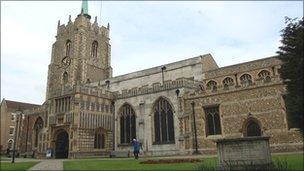Chelmsford: Essex town with all attributes of city
- Published

The church celebrates its centenary of becoming a Cathedral in 2014
Chelmsford has had all the attributes of a city for decades but lacked that official status until Wednesday when the honour was announced.
It has a cathedral, a crown court, a university, a prison and was also the county town of Essex.
Now, as part of the Queen's Diamond Jubilee celebrations it is to become a city in its own right.
The market town was established by Royal Charter in 1199 on an original Anglo Saxon settlement and became the county town of Essex in 1218.
Links to royalty are mixed as the town was in the forefront of the Peasant Revolt during the reign of Richard ll who moved on to conquer the town after dealing harshly with the people of London in 1381.
But all was reconciled by 1516 when Henry Vlll built a palace at Chelmsford for his mistress Ann Boleyn. This Beaulieu Palace was later taken over by his daughter Mary l and in recent years was the site of a school.
Now the royal link has been made permanent with the award of city status.
The town became prominent in the legal system as the place where many of the victims of the Witchfinder General Matthew Hopkins were tried, imprisoned and hanged.
In recent times Chelmsford Prison was the setting for the feature film spin-off from the television programme Porridge starring the late Ronnie Barker and Richard Beckinsale.
Chelmsford College offered a wide range of courses and in recent times degrees have been offered by Anglia Ruskin University which has a campus in the town.
The town was also a pioneer of industries that were to become the foundation of science and technology in the 20th Century.
As a market town surrounded by rich agricultural land it became a centre for the manufacture of traction engines to work on the farms which were becoming increasingly mechanised.
"It's about time the town's status was recognised as it has a rich heritage," local amateur historian Peter Turrall said.
"It was the biggest industrial centre near London and its three pioneering companies employed huge numbers of local people.
"Hoffman, who made ball bearings, had a workforce of 12,000, Marconi had 10,000 and Comptons had 5,000.
"Over the years it had applied several times for city status and now it has been awarded it is well deserved."
Nick Wickenden, museums manager with Chelmsford Museums, said: "If you look historically at the development of Chelmsford, getting city status is the next logical step.
"We have been the communications centre of the county since the 13th Century.
"And now it will forever be associated with the Jubilee year when people look back on the events of the Queen's Jubilee."
Home of radio
Clarksons developed the first steam-driven buses as growing populations needed to depend on more public transport and engineering expertise grew rapidly.
Guglielmo Marconi set up a wireless factory in the town in 1899 and it soon became the home of radio.
Light engineering became an important employer and people began to flock to the town and local villages, such as Broomfield, which soon became engulfed.
Comptons, the first electrical engineering company in Britain, was founded in the town and developed street lighting and traction motors for industry, shipping, construction and power generation.
A chemist's shop producing flavoured waters built up into the Britvic company which still has its headquarters in the town.
The town's industry was heavily bombed during the World War II because many defence companies were based there.
But over the past decade some of these names have been in decline and Chelmsford has suffered as a result with rising unemployment and structural change in the profile of industry, business and commerce.
More service industries are based in the town and it is hoped the new city status will give that a new burst of growth.
The cathedral is the second smallest in England behind Derby but serves a huge population in the county of Essex and a major part of East London.
Its bishop, dean and clergy said they were looking forward to a new role as the city's status develops.
- Published14 April 2011
- Published8 March 2011